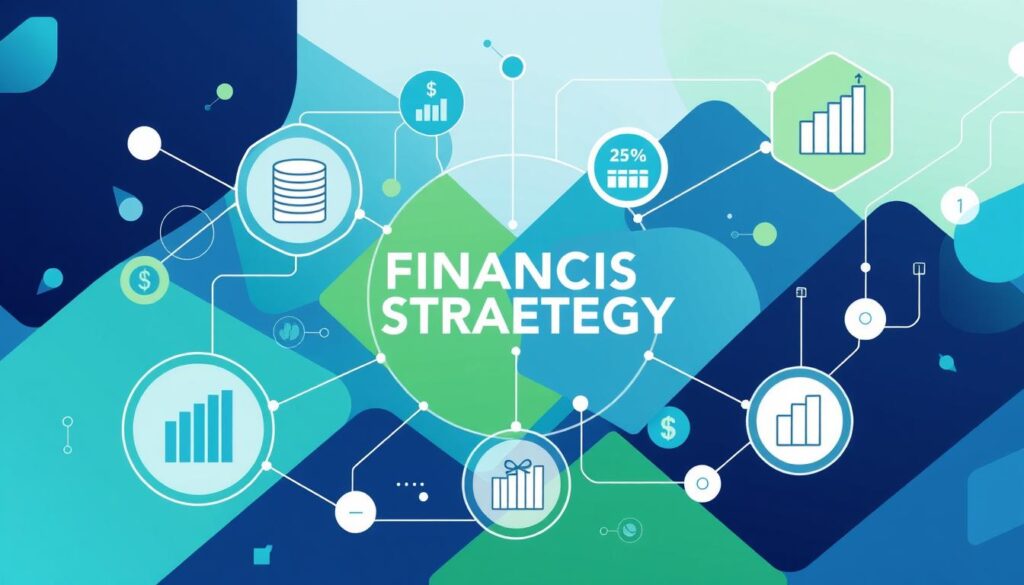תכנון פיננסי אפקטיבי הוא המפתח לביטחון פיננסי ארוך טווח ולניהול עושר. על ידי יצירת תוכנית פיננסית מפורטת, אנשים יכולים לקבל החלטות טובות יותר ולפותח תכניות השקעה מנצחות. לפי לוח ה-CFP, יש להם תחושה יותר גדולה שהם שולטים בכספים שלהם כאשר יש להם תוכנית פיננסית. הם גם יותר סבירים להשיג את חלומותיהם הפיננסיים. בנוסף, חשוב להתאים את התוכניות הללו לערכים אישיים. ההתאמה הזו חיונית לשמירה על מוטיבציה והתמדה בנתיב הפיננסי שלך.
מסקנות מרכזיות
- תכנון פיננסי משפר את הביטחון הכלכלי ואת ניהול העושר.
- פיתוח אסטרטגיה פיננסית מעודד קבלת החלטות טובות יותר.
- לקוחות עם תוכניות פיננסיות תמיד מרגישים יותר בשליטה בכספים שלהם.
- התאמת אסטרטגיות פיננסיות לערכים אישיים היא חיונית.
- תכנון פיננסי אפקטיבי מגביר את הסיכוי להשגת מטרות ארוכות טווח.
הבנת חשיבות התכנון הפיננסי
תכנון פיננסי הוא חיוני לעתיד יציב. זה עוזר לאנשים לקבל החלטות חכמות בנוגע לכספים שלהם. על ידי יצירת תוכנית חזקה, תוכל להשתמש בכספים שלך בחוכמה, לחסוך יותר ולהשקיע טוב יותר.
ידע על תכנון פיננסי משפיע על החלטות המיידיות ועל המטרות העתידיות. הכל על התכונות לעתיד היום.
יתרונות של תכנון פיננסי
יצירת תוכנית פיננסית יש לה מספר יתרונות. זה לא רק על חיסכון; זה על עשיית הכסף שלך לעבוד בשבילך. הנה כמה יתרונות מרכזיים:
- כיוון ברור: זה נותן לך נתיב ברור להגעה למטרות הפיננסיות שלך.
- הקצאת משאבים: עוזר לך לבזבז ולהשקיע את הכסף שלך בחכמה.
- חיסכון מוגבר: מעודד אותך לחסוך באופן קבוע, בניית כלפי מטרות פיננסיות גדולות.
- צמיחת השקעות: תוכנית טובה יכולה להגדיל את השקעותיך בצורה יעילה יותר.
שגיאות נפוצות שכדאי להימנע מהן
עם זאת, טעויות כמה יכולות להאט או לפגוע בהתקדמות הכספית שלך. לדעת את השגיאות הנפוצות אלו יכול לעזור לך להימנע מהן:
- לא להתאים תוכניות: חשוב לעדכן את התוכנית שלך כאשר החיים שלך משתנים.
- הערכת ההחזרים: לצפות יתר על המיד מההשקעות עשוי להוביל לאכזבה.
- התעלמות ממסים: לשכוח מהמסים עשוי לפגוע בבריאות הכספית שלך.
| שגיאה פיננסית | השפעה | אסטרטגיות מניעה |
|---|---|---|
| התעלמות מהתאמות | תוכניות מיושנות עשויות להוביל להפספות בהזדמנויות. | בדוק תוכניות באופן קבוע, במיוחד לאחר שינויים בחיים. |
| הערכת החזרים בצורה מופקעת | מביאה לבחירות השקעה רעות ולהפסדים פיננסיים. | קבע הערכים יציבים בהתבסס על נתונים היסטוריים. |
| התעלמות ממסים | עשויה לגרום להתחייבויות בלתי צפויות ולהפחתת רווחים. | ייעוץ עם מומחה מסים לשילוב תכנון מס באסטרטגיות פיננסיות. |
רכיבי מפתח של פיתוח אסטרטגיית כלכלית
כדי ליצור תוכנית כלכלית חזקה, הבנת חלקי מפתח היא חיונית. ראשית, קביעת יעדים SMART עוזרת לציין אילו תוצאות תרצה להשיג מבחינה כלכלית. שימוש בשיטות תקציבות המתאימות לסגנון החיים שלך הוא גם יסודי לבריאות כלכלית. לבסוף, יש להקצות תקציב למצבי חירום שכאלה יכולים לצאת בצורה פתאומית.
קביעת יעדים כלכליים SMART
יעדים SMART עוזרים להגדיר את היעדים הכלכליים שלך בצורה ברורה ונגישה. הם צריכים להיות Specifc, Measurable, Achievable, Relevant, ו־Time-bound. שיטה זו עוזרת בניטור הצלחה ובכיוון מדויק של התוכניות כפי שנדרש. דוגמה ליעד SMART היא לחסוך 5,000 דולר לטיול עד השנה הבאה. זה הרבה יותר ספציפי מאשר רק לרצות לחסוך.
שיטות תקצוב לכל סגנון חיים
מציאת השיטת תקצוב הנכונה היא מרכזית לניהול הכספים שלך בצורה יעילה. קיימות שיטות שונות המתאימות לצרכים שונים. שתי סוגי שיטות עיקריים הם:
- תקציב מבוסס על אפס: תוכנית זו נותנת לכל דולר עבודה, מאזנת בין הכנסות להוצאות.
- חוק 50/30/20: הוא מחלק את ההכנסה ל-50% לצרכים, 30% לרצונות, ו-20% לחיסכון או לשילום חובות.
הגישות הללו עוזרות לשמור על הוצאות וליישם את המטרות הפיננסיות שלך לאורך זמן.
תפקיד קרנות חירום
קרנות חירום הן חובה לכיסוי עלויות בלתי צפויות מבלי להיכנס לחובות. 40% מהאמריקנים נתקלים בקושי לסגור חשבון של 400 דולר במקרה של חירום, כך אומרת מנהלת המטבע הפדרלית. יש להם חיסכון חירום נותן לך תחושת ביטחון. חכם לחסוך בין שלושה לשישה חודשים של עלויות מחיית על מנת לכסות כל חירום שיתרחש.

| רכיבי אסטרטגיה פיננסית | תיאור |
|---|---|
| מטרות SMART | גישה מתוכננת להגדרת מטרות פיננסיות שאפשר להשיג. |
| טכניקות תקציב | אסטרטגיות אישיות לניהול כספים, כולל תקצוב בהתאם לצרכים וחוק ה-50/30/20. |
| קרנות חירום | קרנות להוצאות פתאומיות, ברצוני כדי לכסות כמה חודשי עלות המחיה. |
אסטרטגיות השקעה לצמיחה ארוכת טווח
השקעה היא מרכזית להשגת חלומות הכספיים הארוכת טווח שלך. ישנן הרבה דרכים לגדל את הכסף שלך במהלך השנים. הבנת האפשרויות שלך עוזרת לך לקבל החלטות חכמות שמתאימות לצרכים שלך ולרמת הסיכון שאתה מוכן לקחת.
סוגי כלי השקעה
ישנן הרבה דרכים להשקיע, כל אחת עם הזדמנויות צמיחה וסיכונים משלה. בין בחירות העל שבהן ניתן למצוא:
- מניות: אתה מקבל חלקות בחברות, שעשויות להביא תמורה גבוהה.
- אגרות חוב: אתה מלווה כסף לממשלות או לעסקים בתמורה לריבית קבועה.
- קרנות נאמנות: הכסף שלך מצטרף לכסף של אחרים, מנוהל על ידי מומחים, להשקעה בדברים שונים.
- נדל"ן: אתה יכול להרוויח מהשכרת נכסים או מעלית בערךם במהלך הזמן.
כל דרך להשקעה היא ייחודית, והיא משפיעה על כמה כסף תוכל להרוויח ועל הסיכונים המעורבים. חשוב להבין את ההבדלים הללו כדי ליצור תוכנית השקעה ארוכת טווח יציבה.
הרכבת תיק השקעות וניהול סיכונים
הפיזור של השקעותיך הוא מרכזי לניהול סיכונים. זה מבטיח שמאזן ההשקעות שלך יהיה יותר יציב. אם השקעה אחת יורדת בערך, זה לא יפגע בכל החסכונות שלך.
כדי לנהל סיכונים בצורה יותר טובה ולפזר את ההשקעות שלך, שקול את האסטרטגיות הבאות:
- לשים את הכסף שלך בסוגי השקעות שונים (מניות, אג"ח, נדל"ן) כדי לפזר סיכונים ורווחים.
- לשנות את תערובת ההשקעות שלך אם השוק משתנה או אם מטרות הכספיות שלך משתנות.
- לבדוק ולהתאים את תערובת ההשקעות שלך מדי פעם כדי לשמור על הסיכון שאתה רוצה.
הבנת אסטרטגיות השקעה לטווח ארוך, המתמקדות בפיזור ההשקעות ובשליטה בסיכונים, עשויה להוביל אותך למטרות הכספיות שלך. גישה מאוזנת עוזרת לשמור על יציבות ההחזרים שלך לעתיד כלכלי בטוח.
אסטרטגיות תכנון מס למקסם ההחזרים
תכנון מס הוא מרכזי לקבלת החלטות כלכליות חכמות. על ידי התמקדות במיסים בזמן ההשקעה, תוכל לשפר את המצב הכלכלי שלך. תנועה חכמה אחת היא להשתמש ב-IRAs וב-401(k)s, שמגדילים את הכסף שלך ללא מס עד שתפרוש אותו.
הפיקוח על ההפסדים המס עוד תוכנית חכמה. זה אומר למכור השקעות שהפסידו ערך. צעד זה יכול להפחית את הסכום שאתה חייב על רווחים אחרים. לדעת על מס רווחי ההון גם יכול להיות שימושי להשקעה חכמה.
האסטרטגיות הללו יכולות באמת לעזור להשקעות שלך להתקדם. אנשים שמשתמשים בהן נוטים לראות תשואות טובות יותר בכל שנה. זה עושה הבדל גדול במהלך הזמן.

לדבר עם מומחה מס הוא צעד חכם. הם מבטיחים שאתה עוקב אחר חוקי המס ומורידים את הסכום שאתה חייב. התכנון החכם הזה הוא מרכזי לחיסכון כספים בטווח הארוך. זה עוזר לך לנווט בחוקי המס המורכבים ולחסוך המון.
מניעת טכנולוגיה לתכנון פיננסי
בעולם של היום, טכנולוגיה היא מרכזית בניהול הכסף שלנו.
אפליקציות פיננסיות שינו את המשחק. הן עושות את החיים קלים יותר ומאפשרות לנו לשמור על התקציב שלנו, על ההשקעות שלנו ועל רווחתנו הפיננסית. חלק זה מתעסק באפליקציות פיננסיות חשובות. גם הוא מכסה איך יועצים פיננסיים מקוונים עוזרים לנו לשפר את ניהול הכספים שלנו.
אפליקציות לתכנון פיננסי שחשוב לך לדעת
הרבה אפליקציות פיננסיות הן כיום חיוניות לשמירה על הכספים שלנו במצב תקין. בואו נסתכל על כמה משחקי מפתח:
- Mint: אפליקציה זו עושה את זה קל לעקוב אחרי ההוצאות שלנו, לתקן את התקציב ולטפל בחשבונות שלנו.
- YNAB (You Need A Budget): YNAB מלמדת אותנו לתקציב במטרה, ומבטיחה שכל דולר יש לו מקום.
- Personal Capital: היא משלבת כלים לתקצוב עם תובנות להשקעה, ומציעה תצוגה מלאה של הפיננסים שלנו.
תפקידם של יועצים פיננסיים מקוונים
קבלת עזרה ממומחים פיננסיים לא הייתה אי פעם קלה יותר, תודות לאינטרנט. אתרים כמו Wealthfront ו-Betterment מביאים ייעוץ מקצועי למרחק נגיעה. הם משתמשים בטכנולוגיה כדי לתת טיפים אישיים בהתבסס על מה שאנו רוצים וכמה סיכון אנו יכולים לקחת. זה עוזר לנו לקבל החלטות כספיות חכמות יותר.

מסקנה
יצירת תוכנית פיננסית טובה היא מפתח לשקט נפשי וביטחון. מאמר זה הדגיש כמה חשוב לציין תוכנית פיננסית מפורטת. דנו בקביעת מטרות SMART ובשימוש בשיטות השקעה שונות.
כל חלק בתוכנית הפיננסית שלך חשוב לעתיד חזק. כאשר אתה מתחיל את תוכנית הפיננסית שלך, וודא שהיא מתאימה לחיים ולחלומות שלך. מה שעוזר לאדם אחד לא בהכרח יעבוד לאחר, לכן התוכנית שלך צריכה להיות ייחודית לך.
כדי להישאר מול המצב, היה פתוח לשינויים בתוכנית שלך כפי שהחיים שלך משתנים. המשך ללמוד על נושאי פיננסים כדי לקבל החלטות חכמות. התחלה מוקדמת על מטרות הפיננסיות שלך ולמידה נוספת יעזורו הרבה. תוכנית פיננסית יציבה היא הצעד הראשון לעתיד מאובטח ומאושר.








